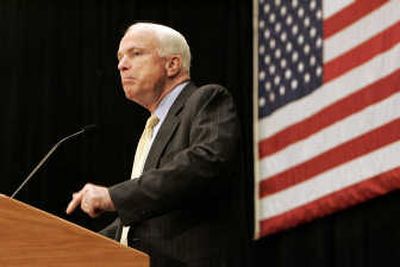McCain continues run despite staffing stumble

CONCORD, N.H. – Sen. John McCain of Arizona vowed Friday not to let a dramatic staff shake-up or shortage of funds deter his bid for the Republican presidential nomination and signaled no slackening in his support for the troop surge strategy in Iraq, accusing his Democratic rivals of defeatism in calling for an early withdrawal of troops.
Appearing outside Washington for the first time since accepting the resignations of two of his most senior advisers over the management and direction of his struggling campaign, McCain brushed aside questions about his ability to compete for the nomination. He promised a return to the style and techniques he used to win this state’s primary eight years ago.
The campaign’s problems have raised doubts about whether McCain can survive in the crowded but still wide-open Republican nomination contest. Asked Friday if he could foresee any circumstances under which he would not still be a candidate by the time of the primary here next January, the former Vietnam prisoner of war replied, “Contracting a fatal disease.”
McCain said he accepted responsibility for the campaign’s problems, which include burning through all of the $24 million raised in the first six months of the year. But he said the formula for winning the nomination has not changed. “We go to the town hall meetings, we fix our financial difficulties, and we win,” he said. “I’m very confident.”
McCain’s campaign was in deep trouble before news broke Tuesday that campaign manager Terry Nelson and chief strategist John Weaver, one of the senator’s closest confidants, had submitted their resignations after a series of confrontations with the candidate over the management of the campaign. McCain then installed Rick Davis as his new campaign manager, a role Davis played eight years ago.
Once seen as the nominal front-runner for the nomination, McCain now faces enormous obstacles against former New York Mayor Rudy Giuliani and former Massachusetts Gov. Mitt Romney, who have significantly more money in the bank than McCain, as well as former Sen. Fred Thompson of Tennessee, who is expected to join the race later this year.
McCain conceded that he has contributed to his own problems, noting that his position favoring comprehensive revision of the nation’s immigration laws cost him considerable support among his party’s conservative base and that his support for the war has hurt him among independents, who were among his strongest constituencies in 2000.
But he said neither is likely to be as much of a problem in the future.